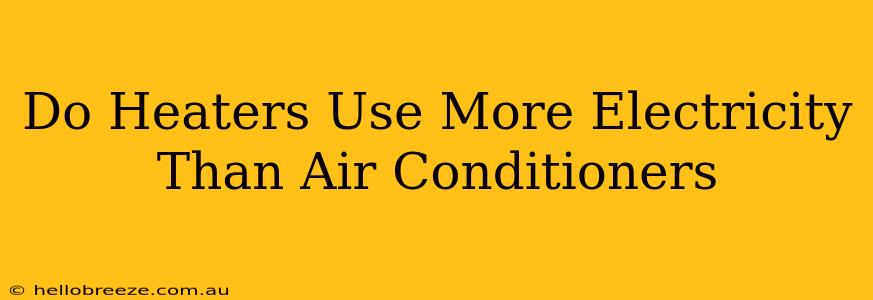Do Heaters Use More Electricity Than Air Conditioners?
The question of whether heaters or air conditioners consume more electricity is a common one, and the answer isn't a simple yes or no. It depends on several factors, including the type of heater and air conditioner, the climate, and your usage habits. Let's delve into the details.
Understanding Heating and Cooling Systems
Electric heaters work by directly converting electricity into heat. This is a relatively straightforward process, with most of the electricity consumed being directly translated into thermal energy. However, the efficiency of this process varies depending on the type of heater.
Types of Electric Heaters and Their Energy Consumption:
-
Resistance Heaters (Space Heaters, Baseboard Heaters): These are the least efficient type. They convert nearly all the electricity they use into heat, but this direct conversion means they can be quite costly to run, especially during extended periods of cold weather.
-
Heat Pumps: These are far more efficient than resistance heaters. They don't generate heat directly; instead, they move heat from one place to another. In heating mode, they extract heat from the outside air (even on cold days) and transfer it indoors. This makes them significantly cheaper to operate than resistance heaters, particularly in milder climates.
Air conditioners, on the other hand, work by removing heat from the indoor air and releasing it outdoors. This process also involves electricity, but the amount used is often less than with resistance heaters, especially in moderate climates. The efficiency of an air conditioner is measured by its SEER rating (Seasonal Energy Efficiency Ratio) – a higher SEER rating means lower energy consumption.
Factors Affecting Electricity Consumption
Several factors influence the amount of electricity consumed by both heaters and air conditioners:
-
Climate: In extremely cold climates, heaters, especially resistance heaters, will use significantly more electricity. In hot and humid climates, air conditioners will consume more power. Milder climates generally lead to lower energy consumption for both.
-
Size of the Unit: Larger units designed for bigger spaces will naturally consume more electricity than smaller ones. Properly sizing your heating and cooling systems is crucial for efficiency.
-
Insulation and Weatherproofing: A well-insulated home will require less heating and cooling, reducing overall electricity consumption for both. Proper sealing of windows and doors further minimizes energy loss.
-
Usage Habits: Keeping your thermostat at a comfortable but moderate temperature, using timers or programmable thermostats, and minimizing unnecessary heating or cooling will significantly impact your electricity bills.
So, which uses more electricity?
Generally, resistance electric heaters tend to use more electricity than air conditioners, particularly in moderate climates. However, heat pumps are often more energy-efficient than both resistance heaters and air conditioners. The overall energy consumption depends greatly on the specific units, climate, and usage.
To determine which is more energy-intensive in your situation, consider:
- The type of heating system you have.
- The SEER rating of your air conditioner.
- Your local climate.
- Your home's insulation and air sealing.
By understanding these factors, you can make informed decisions about energy consumption and potentially save money on your electricity bills. Consider consulting with an HVAC professional for a personalized assessment of your heating and cooling needs.

